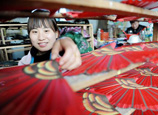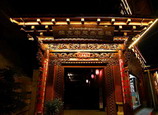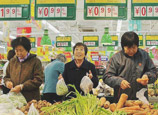
Greatly affected by the government's crackdown on wasting public money on luxury banquets, growth in China's catering industry has plunged to its slowest rate in a decade, the China Cuisine Association said on Wednesday.
In the first two months of this year, which included the Spring Festival holiday, the sales revenue of the country's catering industry reached 403 billion yuan ($65 billion), a year-on-year growth of 8.4 percent, the slowest growth in the past 10 years, according to the association.
"The slump in the industry, especially for luxury restaurants, has occurred since late last year," said Su Qiucheng, head of the China Cuisine Association.
"Restaurants in some big cities even posted negative sales growth, such as Beijing and cities in Jiangsu and Zhejiang provinces."
At the end of last year, the central government unveiled new anti-graft rules, including banning lavish meals and unnecessary overseas trips, as well as over-the-top welcoming ceremonies.
It has not taken long for the catering industry to feel the impact.
According to the association, nearly 60 percent of restaurants dinner reservations were cancelled during Spring Festival, and most of these were at luxury restaurants or five-star hotels.
"Business has been hit greatly at our restaurant," said Ren Xiuqin, general manager of Laolaofu Seafood Hotpot, one of the top hotpot restaurants in Beijing. "Spending has decreased at least 60 to 70 yuan per head."
Chen Junhai, an executive at Wangshunge Restaurant Group, said about 30 percent of its income comes from business customers, hosting luxury banquets to entertain VIP guests. So the move to eradicate publicly funded extravagance had been a big blow for them.
Some leading high-end catering businesses face being plunged into the red as a result.
Beijing Xiangeqing Co Ltd said that its first quarter financial loss may reach 55 million to 70 million yuan, compared with a net profit of 46.23 million yuan during the same period last year.
ShunFung and Jingya restaurants, another two extravagant eateries, withdrew their IPO applications due to the harsh situation, according to the China Securities Journal on Wednesday.
But Bian Jiang, assistant director of China Cuisine Association, said the habit of pleasing business clients with extravagant banquets is deeply rooted in Chinese culture and will not be reversed overnight.
Duan Kaiyun, assistant secretary-general of Beijing Cuisine Association, said: "The difficult period will last for a long time, as it's a key part of the new government's vow to curb corruption."
As a result, luxury restaurants will be forced to enter a new phase of business adjustment, such as lowering prices and introducing more promotions, Duan added.


















![]()
